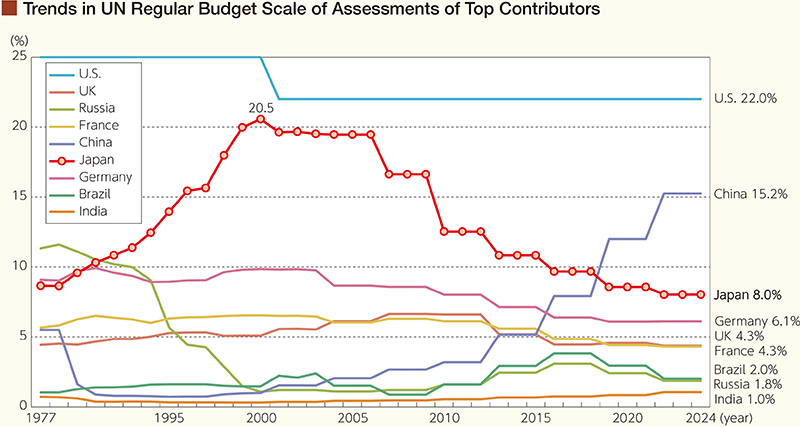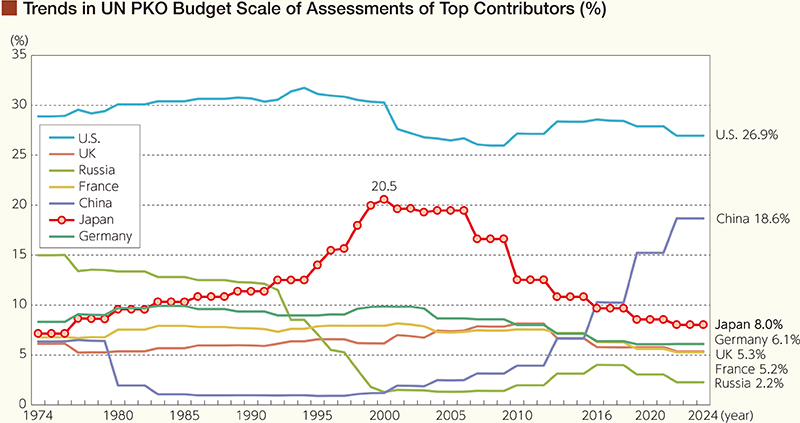Diplomatic Bluebook 2023
Chapter 3
Japan's Foreign Policy to Promote National and Global Interests
5 Japan's Efforts at the United Nations
(1) Japan-UN Relationship
The UN is an international organization that nearly all the countries in the world are currently members of (193 countries as of December 2022). It addresses various challenges in diverse areas such as conflict resolution and peacebuilding, counter-terrorism, disarmament and non-proliferation, poverty and development, human rights, refugee issues, environment and climate change issues, disaster risk reduction, and public health.
Since joining the UN in 1956, Japan has leveraged on both universality and expertise to realize policy aims through multilateral cooperation in a wide range of areas, including the three pillars of the UN─peace and security, development, and human rights. An important example of this is that Japan has fulfilled its key role in the maintenance of international peace and security, such as having served as a non-permanent member of the UN Security Council more frequently than any other UN Member State. In order to support such activities, the Government of Japan financially contributes to the UN alongside actively engaging in the organizational aspects (management) of the UN. Japan also supports Japanese staff working in the UN to obtain important posts (see Chapter 4, Section 1, 2(1)). Given the pressing challenge of making the UN an efficient organization that is effective and well-suited to the 21st century, Japan continues to proactively engage in the reformation of the UN, including the UN Security Council.
(2) Major Events in 2022
The High-Level Week of the 77th UN General Assembly convened in September, taking a fully in-person format for the first time in three years. Prime Minister Kishida and Foreign Minister Hayashi attended from Japan.
In the General Debate of the UN General Assembly, Prime Minister Kishida addressed the following three pillars on Japan's determination to achieve the visions of the UN: (1) strengthening of the functions of the UN including the UN Security Council; (2) achieving a UN that promotes the rule of law in the international community; (3) promoting efforts based on the concept of human security in the new era. He noted lending a sincere ear to the voices of each country as well as demonstrating Japan's strong commitment to the UN and to multilateralism.
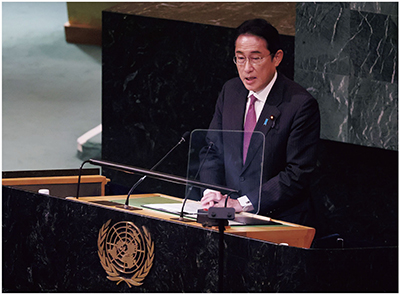 Prime Minister Kishida delivering an address at the General Debate of the UN General Assembly (September 20, New York, U.S. Photo: Cabinet Public Affairs Office)
Prime Minister Kishida delivering an address at the General Debate of the UN General Assembly (September 20, New York, U.S. Photo: Cabinet Public Affairs Office)Prime Minister Kishida also attended three other meetings during the High-Level Week. Delivering a speech at the “HeForShe” Summit45 organized by UN Women, Prime Minister Kishida as a HeForShe Champion said that “women's economic independence” is at the core of the “New Form of Capitalism,” and spoke about the importance of enabling all women to choose their own paths in life. At the High-Level Meeting of the Friends of the Comprehensive Nuclear-Test-Ban Treaty (CTBT), he stressed the importance of the universalization of the CTBT and its early entry into force, as well as the strengthening of the verification system. Furthermore, at the Global Fund's Seventh Replenishment Conference46 hosted by President Biden of the U.S., Prime Minister Kishida stated that strengthening health systems under the initiative of the Global Fund will lead to better preparedness for future pandemics and contribute to achieving universal health coverage (UHC), and stressed the need for the international community to work together to accelerate such efforts. He also announced Japan's intent of contributing up to 1.08 billion US dollars to the Global Fund over the next three years.
Prime Minister Kishida took the opportunity to hold six summit meetings and five informal talks with leaders of various countries, working tirelessly to exchange opinions on bilateral relations as well as on various issues in the international arena, such as the response to Russia's aggression against Ukraine.
During his stay in New York, Prime Minister Kishida also attended a reception to promote Japanese food culture. He also delivered remarks at the New York Stock Exchange (NYSE). In doing so, he explained Japanese economic and fiscal policy directly to experts and business people, actively communicated the attractiveness of Japan, as well as called for investments in Japan. In addition, he held a dialogue with executives of the NYSE and U.S. businesses, as well as observed the signing of a Memorandum of Understanding between the Tokyo Stock Exchange and the NYSE.
Foreign Minister Hayashi engaged in active diplomacy during the High-Level Week, attending a total of eight multilateral conferences, including the G7 Foreign Ministers' Meeting, Meeting of the Foreign Ministers of the G4 countries on UN Security Council Reform, and Japan-U.S.-ROK Foreign Ministers' Meeting, as well as 15 bilateral meetings and two summit meetings. In his meetings with various countries, Foreign Minister Hayashi engaged in discussions focusing on strengthening the functions of the UN as a whole, including UN Security Council reform, restoring trust in the UN, and thoroughly upholding the rule of law, while reflecting the contents of Prime Minister Kishida's address at the General Debate. Furthermore, he affirmed cooperation on regional situations including Ukraine, China, and North Korea, and communicated Japan's stance on issues such as food and energy security, and UHC, to the international community.
Foreign Minister Hayashi held a meeting with UN General Assembly President Kőrösi Csaba, during which he expressed his support for strengthening the functions of the General Assembly and for President Kőrösi's leadership.
In August, UN Secretary-General António Guterres visited Japan. During the visit, he attended the Hiroshima Peace Memorial Ceremony held in Hiroshima and held a meeting with Prime Minister Kishida. Prime Minister Kishida stated that Japan, as the only country to have ever suffered atomic bombings during wartime, will lead international efforts toward a world without nuclear weapons. Both parties concurred to continue to work closely. Prime Minister Kishida also took the opportunity to meet with UN Secretary General Guterres during the NPT Review Conference held the same month.
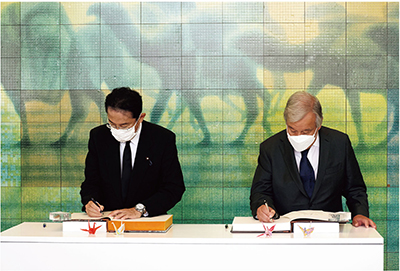 Prime Minister Kishida and UN Secretary-General Guterres signing the guestbook at the Hiroshima Peace Memorial Museum (August 6, Hiroshima. Photo: Cabinet Public Affairs Office)
Prime Minister Kishida and UN Secretary-General Guterres signing the guestbook at the Hiroshima Peace Memorial Museum (August 6, Hiroshima. Photo: Cabinet Public Affairs Office)In response to Russia's aggression against Ukraine from February and Russia's exercising of its veto in the UN Security Council on two occasions, six emergency special sessions of the UN General Assembly were held up till February 2023, and General Assembly resolutions were adopted at each of these sessions (See the Special Feature Russia's Aggression Against Ukraine and Japan's Response on page 27). Japan became a co-sponsor of these resolutions, and urged Russia to listen carefully to the overwhelming voices of the international community and to implement the resolutions.
- 45 The “HeForShe” Summit is an event organized as a part of the HeForShe Movement conducted by UN Women with the aim of raising awareness and involvement among men in initiatives aimed at realizing gender equality. The events participants include male leaders and stakeholders from the government, private companies, educational institutions, and non-profit organizations. HeForShe Champions refer to male leaders from various sectors selected in this movement.
- 46 Established in 2002, the Global Fund has served as a public-private partnership for countermeasures against infectious diseases, which were first addressed as a major summit agenda item at the G8 Kyushu-Okinawa Summit in 2000. It provides financial assistance toward strengthening public health systems and implementing countermeasures in developing countries against the three major infectious diseases (HIV, tuberculosis, and malaria), and contributes to efforts to achieve the SDGs. It is a major organization that supports infectious disease countermeasures. Japan has contributed approximately 4.3 billion US dollars cumulatively (as of 2022), ranking fifth among the donor countries.
(3) United Nations Security Council and its Reform
A United Nations Security Council
The UN Security Council holds the primary responsibility within the UN for maintaining international peace and security. It is composed of five permanent members and 10 non-permanent members that are elected by UN Member States (for two-year terms). Japan was elected as a non-permanent member of the UN Security Council in June, and will serve a two-year term from January 2023 as a non-permanent member for the 12th time, which is more than any other UN Member State. In January, the month that Japan held the Security Council presidency, Foreign Minister Hayashi visited New York and hosted the ministerial Open Debate on the rule of law. Japan also hosted the ambassadorial-level meeting on peacebuilding during its presidency. The UN Security Council's agenda covers a wide range of areas from the peaceful settlement of disputes and addressing proliferation of weapons of mass destruction and terrorism, to peacebuilding and women, peace and security. In recent years, new themes such as climate change and food security have also been covered. The UN Security Council also has a mandate to determine the details of activities in UN Peacekeeping Operations (PKO) and UN Special Political Missions (SPM).
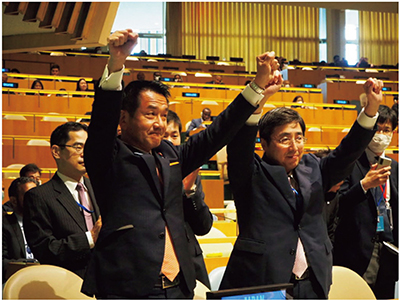 State Minister for Foreign Affairs Odawara attending the election for non-permanent members of the UN Security Council─the moment when Japan was elected (Left in the photo) (June 9, New York)
State Minister for Foreign Affairs Odawara attending the election for non-permanent members of the UN Security Council─the moment when Japan was elected (Left in the photo) (June 9, New York)The UN Security Council has not been functioning effectively, as shown by Russia's (a permanent member of the Council) aggression against Ukraine and North Korea's nuclear and missile activities that repeat violations of UN Security Council resolutions and threaten the peace and security of Japan, the region and the international community. Under such circumstances, Japan will communicate closely with each country and engage in dialogues, throughout its two-year term on the Council, with the aim of maintaining and strengthening international order based on the rule of law while cooperating to enable the UN Security Council to fulfill its expected role. Japan will also contribute actively to discussions on the response to regional issues in the Middle East, Africa, and other regions, as well as on global issues such as climate change. As it has contributed during previous terms, Japan will continue to work on improving the procedures of the UN Security Council, including enhancing the efficiency and transparency of the Council.
B Reform of the UN Security Council
More than 75 years have passed since the UN was established, and the structure of the international community has significantly changed while the UN's functions have become diverse. Despite this, the composition of the UN Security Council has largely remained unchanged to this day. In response to Russia's aggression against Ukraine in February, a resolution that deplores the aggression by Russia was put to a vote in the UN Security Council. However, it was not adopted as Russia exercised its veto. Consequently, the UN Security Council was unable to take a coordinated response. This clearly shows that the UN Security Council cannot adequately fulfill the functions expected by the international community today. There is a broadly shared view among the international community that an early reform of the UN Security Council is necessary to make the body more legitimate, effective and representative.
To play an even more proactive role toward the realization of world peace and security through the UN, Japan has been making efforts to convince other countries to pursue an early UN Security Council reform, with the expansion of both permanent and non-permanent seats and Japan's admission as a permanent member.
C Recent Activities Regarding UN Security Council Reform
Since 2009, in the UN General Assembly, Member States have been engaging in the Intergovernmental Negotiations on UN Security Council reform. In 2022, five meetings took place between February and May. At the end of June, the decision for the 77th session to roll over the work of the 76th session including the expression “instill new life in the discussions on the reform of the Security Council,” was adopted by consensus at the UN General Assembly. In October, about one month earlier than in 2021, President Kőrösi of the 77th session of the UN General Assembly appointed the Permanent Representatives of Kuwait and Slovakia to the UN as co-chairs of the Intergovernmental Negotiations. The spotlight will be placed on how future discussions will progress under the new system.
Japan also places great importance on its initiatives as a member of the G4 (Japan, India, Germany and Brazil), a group that cooperates on promoting UN Security Council reform. Foreign Minister Hayashi attended the Meeting of the Foreign Ministers of the G4 countries in September in conjunction with the High-Level Week of the UN General Assembly. At the meeting, the G4 Foreign Ministers shared their understanding of the current situation of UN Security Council reform and discussed future directions for their cooperation with member countries, based on the view that the foundation of the international order, which the UN has been playing a central role in the development of, is being shaken due to Russia's aggression against Ukraine and other challenges. With a view to restoring confidence in the UN and bearing in mind that many countries have mixed expectations and dissatisfaction toward the UN Security Council, Foreign Minister Hayashi suggested that Security Council reform be put in the context of strengthening the functions of the entire UN, including efforts to strengthen the roles of the General Assembly and the Secretary-General to increase momentum of the reform. To realize Security Council reform, the Ministers agreed to cooperate closely with the President of the General Assembly to launch text-based negotiations in the Intergovernmental Negotiations, to work with relevant countries such as Africa and the U.S., and to seek concrete progress as early as possible. On December 14, State Minister for Foreign Affairs YAMADA Kenji attended the Security Council Open Debate on New Orientation for Reformed Multilateralism, including UN Security Council reform. He emphasized that UN Security Council reform is possible and achievable, and strived to raise momentum toward it. Japan will continue to cooperate closely with countries that support the reform, and to be positively involved in the process toward the realization of UN Security Council reform.
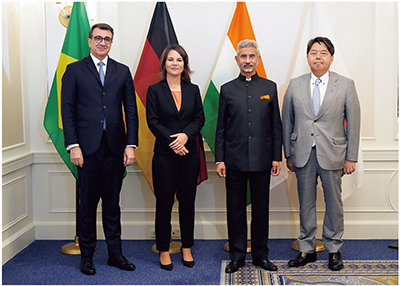 G4 Foreign Ministers before their meeting (September 22, New York, U.S.)
G4 Foreign Ministers before their meeting (September 22, New York, U.S.)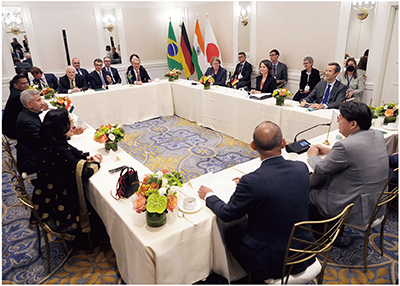 Ministerial Meeting of the G4 countries on UN Security Council Reform (September 22, New York, U.S.)
Ministerial Meeting of the G4 countries on UN Security Council Reform (September 22, New York, U.S.)(4) Organizational Aspects of the United Nations (Management)
A Management
UN Secretary-General Guterres positions peace efforts and development along with reforms in the management of the UN as issues of priority, and works continuously to enhance the efficiency and effectiveness of the UN Secretariat's functions. In 2021, he issued a report titled “Our Common Agenda” which proposed concrete measures for the UN to adapt to a new era. Discussions are ongoing among UN Member States and other stakeholders to bring about the realization of these recommendations. Japan supports the objectives of the reform with the hope that the UN will fulfill its mission more effectively and efficiently.
B Budget
The UN budget is mainly composed of the regular budget for general activities (an annual budget for the period from January to December, implemented on a trial basis from 2020 to 2022), and the peacekeeping budget related to peacekeeping operations (an annual budget for the period from July to the following June).
With regard to the regular budget, a budget for 2023 amounting to approximately 3.4 billion US dollars was approved in December 2022 at the UN General Assembly. The budget for peacekeeping operations for the period of 2022-2023 amounting to approximately 6.45 billion US dollars in total was approved in June 2022 (an increase of approximately 1.2% from the final budget of the previous period).
The budget to support UN activities is composed of assessed contributions paid by Member States and voluntary contributions provided in accordance with Member States' policy needs. With regard to assessed contributions, Japan currently ranks third after the U.S. and China. Japan contributed approximately 230.76 million US dollars to the UN regular budget for 2022, and approximately 518.33 million US dollars to the peacekeeping budget for 2022/23. As a major financial contributor, Japan has been encouraging the UN to make more efficient and effective use of its financial resources. The scale of assessments, which provides the basis for calculating the amount of assessed contributions, is revised every three years based on the capacities to pay of the Member States. Japan's scale of assessment, revised at the end of 2021, is 8.033% (2022-2024), behind the U.S. and China.
Key bodies that address administrative and budgetary matters of the UN are the Advisory Committee on Administrative and Budgetary Questions (ACABQ) and the Committee on Contributions. Both are standing subsidiary committees of the General Assembly and are comprised of members serving in their personal capacities. The ACABQ reviews the overall administrative and budgetary issues of the UN and makes recommendations to the General Assembly, while the Committee on Contributions submits a proposal on the scale of assessments of the regular budget for a decision to be made by all Member States at the General Assembly. Hence, both committees play an important role. Members from Japan have served continuously on both of these committees.
